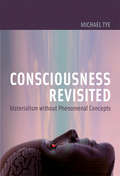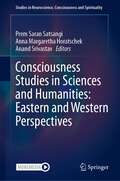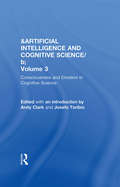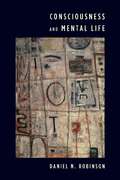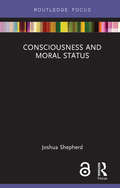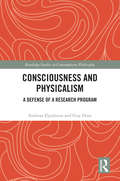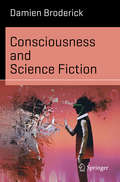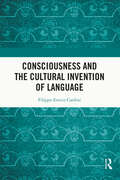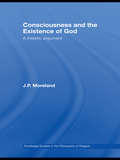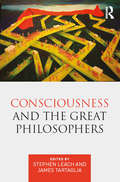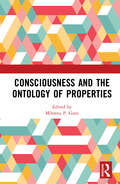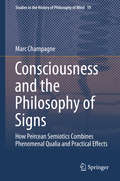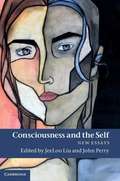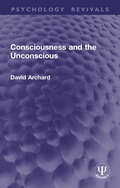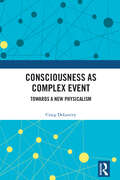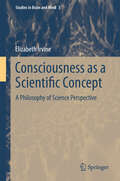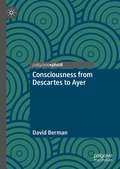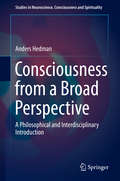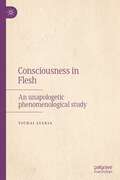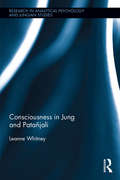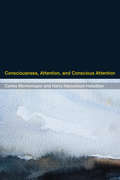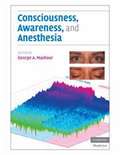- Table View
- List View
Consciousness Reconsidered
by Owen FlanaganConsciousness is neither miraculous nor ultimately mysterious. In this broad, entertaining, and persuasive account, Flanagan argues that we are on the way to understanding consciousness and its place in the natural order. No aspect of consciousness escapes Flanagan's probe. Qualia, self-consciousness, disorders such as blindsight, various kinds of amnesia, and multiple personalities all find a place in this powerful synthetic theory that contends that consciousness is real, plays an important causal role, and resides in the brain.
Consciousness Revisited: Materialism without Phenomenal Concepts (Representation and Mind series)
by Michael TyeFour major puzzles of consciousness philosophical materialism must confront after rejecting the phenomenal concept strategy.We are material beings in a material world, but we are also beings who have experiences and feelings. How can these subjective states be just a matter of matter? To defend materialism, philosophical materialists have formulated what is sometimes called "the phenomenal-concept strategy," which holds that we possess a range of special concepts for classifying the subjective aspects of our experiences. In Consciousness Revisited, the philosopher Michael Tye, until now a proponent of the the phenomenal-concept strategy, argues that the strategy is mistaken.A rejection of phenomenal concepts leaves the materialist with the task of finding some other strategy for defending materialism. Tye points to four major puzzles of consciousness that arise: How is it possible for Mary, in the famous thought experiment, to make a discovery when she leaves her black-and-white room? In what does the explanatory gap consist and how can it be bridged? How can the hard problem of consciousness be solved? How are zombies possible? Tye presents solutions to these puzzles—solutions that relieve the pressure on the materialist created by the failure of the phenomenal-concept strategy. In doing so, he discusses and makes new proposals on a wide range of issues, including the nature of perceptual content, the conditions necessary for consciousness of a given object, the proper understanding of change blindness, the nature of phenomenal character and our awareness of it, whether we have privileged access to our own experiences, and, if we do, in what such access consists.
Consciousness Studies in Sciences and Humanities: Eastern and Western Perspectives (Studies in Neuroscience, Consciousness and Spirituality #8)
by Anand Srivastav Prem Saran Satsangi Anna Margaretha HoratschekThis book presents consciousness models from Eastern and Western perspectives that accommodate current scientific research in the natural sciences and humanities, from neurological experiments through philosophical enquiries to spiritual approaches. It offers up to date research from key disciplines in consciousness studies ranging from neurology, quantum mechanics, algorithmic science, mathematics, and astrophysics to literary studies, philosophy, and (comparative) theology. The volume examines the dichotomy between Western and Eastern perceptions of consciousness – where consciousness is perceived as brain activity by Western scientists, and as a divine presence by various religions, especially in the East. The essays contextualize each other and reciprocally illuminate the potential and limits of the respective approaches. The texts aim at a transdisciplinary and transcultural exchange of ideas in consciousness studies and address a readership from interested lay-readers to experts of the field. The volume is of interest to researchers of consciousness studies.
Consciousness and Emotion in Cognitive Science: Conceptual and Empirical Issues (Artificial Intelligence And Cognitive Science Ser.)
by Andy Clark Josefa ToribioFirst published in 1998. Routledge is an imprint of Taylor & Francis, an informa company.
Consciousness and Mental Life
by Daniel N. RobinsonIn recent decades, issues that reside at the center of philosophical and psychological inquiry have been absorbed into a scientific framework variously identified as "brain science," "cognitive science," and "cognitive neuroscience." Scholars have heralded this development as revolutionary, but a revolution implies an existing method has been overturned in favor of something new. What long-held theories have been abandoned or significantly modified in light of cognitive neuroscience? Consciousness and Mental Life questions our present approach to the study of consciousness and the way modern discoveries either mirror or contradict understandings reached in the centuries leading up to our own. Daniel N. Robinson does not wage an attack on the emerging discipline of cognitive science. Rather, he provides the necessary historical context to properly evaluate the relationship between issues of consciousness and neuroscience and their evolution over time. Robinson begins with Aristotle and the ancient Greeks and continues through to René Descartes, David Hume, William James, Daniel Dennett, John Searle, Richard Rorty, Hilary Putnam, and Derek Parfit. Approaching the issue from both a philosophical and a psychological perspective, Robinson identifies what makes the study of consciousness so problematic and asks whether cognitive neuroscience can truly reveal the origins of mental events, emotions, and preference, or if these occurrences are better understood by studying the whole person, not just the brain. Well-reasoned and thoroughly argued, Consciousness and Mental Life corrects many claims made about the success of brain science and provides a valuable historical context for the study of human consciousness.
Consciousness and Mental Life
by Daniel N. RobinsonIn recent decades, issues that reside at the center of philosophical and psychological inquiry have been absorbed into a scientific framework variously identified as "brain science," "cognitive science," and "cognitive neuroscience." Scholars have heralded this development as revolutionary, but a revolution implies an existing method has been overturned in favor of something new. What long-held theories have been abandoned or significantly modified in light of cognitive neuroscience? Consciousness and Mental Life questions our present approach to the study of consciousness and the way modern discoveries either mirror or contradict understandings reached in the centuries leading up to our own. Daniel N. Robinson does not wage an attack on the emerging discipline of cognitive science. Rather, he provides the necessary historical context to properly evaluate the relationship between issues of consciousness and neuroscience and their evolution over time. Robinson begins with Aristotle and the ancient Greeks and continues through to René Descartes, David Hume, William James, Daniel Dennett, John Searle, Richard Rorty, Hilary Putnam, and Derek Parfit. Approaching the issue from both a philosophical and a psychological perspective, Robinson identifies what makes the study of consciousness so problematic and asks whether cognitive neuroscience can truly reveal the origins of mental events, emotions, and preference, or if these occurrences are better understood by studying the whole person, not just the brain. Well-reasoned and thoroughly argued, Consciousness and Mental Life corrects many claims made about the success of brain science and provides a valuable historical context for the study of human consciousness.
Consciousness and Moral Status (Routledge Focus on Philosophy)
by Joshua ShepherdIt seems obvious that phenomenally conscious experience is something of great value, and that this value maps onto a range of important ethical issues. For example, claims about the value of life for those in Permanent Vegetative State (PVS); debates about treatment and study of disorders of consciousness; controversies about end-of-life care for those with advanced dementia; and arguments about the moral status of embryos, fetuses, and non-human animals arguably turn on the moral significance of various facts about consciousness. However, though work has been done on the moral significance of elements of consciousness, such as pain and pleasure, little explicit attention has been devoted to the ethical significance of consciousness. In this book Joshua Shepherd presents a systematic account of the value present within conscious experience. This account emphasizes not only the nature of consciousness, but also the importance of items within experience such as affect, valence, and the complex overall shape of particular valuable experiences. Shepherd also relates this account to difficult cases involving non-humans and humans with disorders of consciousness, arguing that the value of consciousness influences and partially explains the degree of moral status a being possesses, without fully determining it. The upshot is a deeper understanding of both the moral importance of phenomenal consciousness and its relations to moral status. This book will be of great interest to philosophers and students of ethics, bioethics, philosophy of psychology, philosophy of mind, and cognitive science.
Consciousness and Perceptual Experience
by Thomas NatsoulasThis book describes and proposes an unusual integrative approach to human perception that qualifies as both an ecological and a phenomenological approach at the same time. Thomas Natsoulas shows us how our consciousness - in three of six senses of the word that the book identifies - is involved in our activity of perceiving the one and only world that exists, which includes oneself as a proper part of it, and that all of us share together with the rest of life on earth. He makes the case that our stream of consciousness - in the original Jamesian sense minus his mental/physical dualism - provides us with firsthand contact with the world, as opposed to our having such contact instead with theorist-posited items such as inner mental representations, internal pictures, or sense-image models, pure figments and virtual objects, none of which can have effects on our sensory receptors.
Consciousness and Physicalism: A Defense of a Research Program (Routledge Studies in Contemporary Philosophy)
by Andreas Elpidorou Guy DoveConsciousness and Physicalism: A Defense of a Research Program explores the nature of consciousness and its place in the world, offering a revisionist account of what it means to say that consciousness is nothing over and above the physical. By synthesizing work in the philosophy of mind, metaphysics, and philosophy of science from the last twenty years and forging a dialogue with contemporary research in the empirical sciences of the mind, Andreas Elpidorou and Guy Dove advance and defend a novel formulation of physicalism. Although physicalism has been traditionally understood to be a metaphysical thesis, Elpidorou and Dove argue that there is an alternative and indeed preferable understanding of physicalism that both renders physicalism a scientifically informed explanatory project and allows us to make important progress in addressing the ontological problem of consciousness. Physicalism, Elpidorou and Dove hold, is best viewed not as a thesis (metaphysical or otherwise) but as an interdisciplinary research program that aims to compositionally explain all natural phenomena that are central to our understanding of our place in nature. Consciousness and Physicalism is replete with philosophical arguments and informed, through and through, by findings in many areas of scientific research. It advances the debate regarding the ontological status of consciousness. It will interest students and scholars in philosophy of mind, metaphysics, philosophy of cognitive science, and philosophy of science. And it will challenge both foes and friends of physicalism.
Consciousness and Science Fiction (Science and Fiction)
by Damien BroderickScience fiction explores the wonderful, baffling and wildly entertaining aspects of a universe unimaginably old and vast, and with a future even more immense. It reaches into that endless cosmos with the tools of rational investigation and storytelling. At the core of both science and science fiction is the engaged human mind--a consciousness that sees and feels and thinks and loves. But what is this mind, this aware and self-aware consciousness that seems unlike anything else we experience? What makes consciousness the Hard Problem of philosophy, still unsolved after millennia of probing? This book looks into the heart of this mystery - at the science and philosophy of consciousness and at many inspiring fictional examples - and finds strange, challenging answers.The book's content and entertaining style will appeal equally to science fiction enthusiasts and scholars, including cognitive and neuroscientists, as well as philosophers of mind. It is a refreshing romp through the science and science fiction of consciousness.
Consciousness and the Cultural Invention of Language
by Filippo-Enrico CardiniThis book studies the origins of language. It presents language as the product of a unique non-linguistic cognitive feature (i.e., metacognition) that emerged late in human evolution. Within this framework, the author lays special emphasis on the tight links that exist between language and consciousness, with the conviction that the creation of language was ultimately made possible by the onset of a new type of awareness that enabled the invention of words. The volume studies the parallels between human cultural behaviour and human language, discusses the motivational underpinnings that favoured the emergence of language, and offers a possible evolutionary timeline for the advent of language. It also addresses the questions of whether artificial intelligence will ever develop the kind of thinking and language observable in humans. A unique look into the beginnings of human language, this book will be indispensable for students and researchers of language and linguistics, language evolution, cultural studies, cognitive linguistics, psycholinguistics, and cognitive science.
Consciousness and the Existence of God: A Theistic Argument (Routledge Studies in the Philosophy of Religion #Vol. 4)
by J.P. MorelandIn Consciousness and the Existence of God, J.P. Moreland argues that the existence of finite, irreducible consciousness (or its regular, law-like correlation with physical states) provides evidence for the existence of God. Moreover, he analyzes and criticizes the top representative of rival approaches to explaining the origin of consciousness, including John Searle’s contingent correlation, Timothy O’Connor’s emergent necessitation, Colin McGinn’s mysterian ‘‘naturalism,’’ David Skrbina’s panpsychism and Philip Clayton’s pluralistic emergentist monism. Moreland concludes that these approaches should be rejected in favor of what he calls ‘‘the Argument from Consciousness.’’
Consciousness and the Great Philosophers: What would they have said about our mind-body problem?
by Stephen Leach and James TartagliaConsciousness and the Great Philosophers addresses the question of how the great philosophers of the past might have reacted to the contemporary problem of consciousness. Each of the thirty-two chapters within this edited collection focuses on a major philosophical figure from the history of philosophy, from Anscombe to Xuanzang, and imaginatively engages with the problem from their perspective. Written by leading experts in the field, this exciting and engaging book explores the relevance of the history of philosophy to contemporary debates and therefore is essential reading for students and scholars studying the history of philosophy, contemporary philosophy of mind and consciousness, or both.
Consciousness and the Ontology of Properties
by Mihretu P. GutaThis book aims to show the centrality of a proper ontology of properties in thinking about consciousness. Philosophers have long grappled with what is now known as the hard problem of consciousness, i.e., how can subjective or qualitative features of our experience—such as how a strawberry tastes—arise from brain states? More recently, philosophers have incorporated what seems like promising empirical research from neuroscience and cognitive psychology in an attempt to bridge the gap between measurable mental states on the one hand, and phenomenal qualities on the other. In Consciousness and the Ontology of Properties, many of the leading philosophers working on this issue, as well as a few emerging scholars, have written 14 new essays on this problem. The essays address topics as diverse as substance dualism, mental causation, the metaphysics of artificial intelligence, the logic of conceivability, constitution, extended minds, the emergence of consciousness, and neuroscience and the unity and neural correlates of consciousness, but are nonetheless unified in a collective objective: the need for a proper ontology of properties to understand the hard problem of consciousness, both on non-empirical and empirical grounds.
Consciousness and the Philosophy of Signs: How Peircean Semiotics Combines Phenomenal Qualia And Practical Effects (Studies in the History of Philosophy of Mind #19)
by Marc ChampagneIt is often thought that consciousness has a qualitative dimension that cannot be tracked by science. Recently, however, some philosophers have argued that this worry stems not from an elusive feature of the mind, but from the special nature of the concepts used to describe conscious states. Marc Champagne draws on the neglected branch of philosophy of signs or semiotics to develop a new take on this strategy. The term “semiotics” was introduced by John Locke in the modern period – its etymology is ancient Greek, and its theoretical underpinnings are medieval. Charles Sanders Peirce made major advances in semiotics, so he can act as a pipeline for these forgotten ideas. Most philosophers know Peirce as the founder of American pragmatism, but few know that he also coined the term “qualia,” which is meant to capture the intrinsic feel of an experience. Since pragmatic verification and qualia are now seen as conflicting commitments, Champagne endeavors to understand how Peirce could (or thought he could) have it both ways. The key, he suggests, is to understand how humans can insert distinctions between features that are always bound. Recent attempts to take qualities seriously have resulted in versions of panpsychism, but Champagne outlines a more plausible way to achieve this. So, while semiotics has until now been the least known branch of philosophy ending in –ics, his book shows how a better understanding of that branch can move one of the liveliest debates in philosophy forward.
Consciousness and the Self
by John Perry Jeeloo Liu'I never can catch myself at any time without a perception, and never can observe any thing but the perception.' These famous words of David Hume, on his inability to perceive the self, set the stage for JeeLoo Liu and John Perry's collection of essays on self-awareness and self-knowledge. This volume connects recent scientific studies on consciousness with the traditional issues about the self explored by Descartes, Locke and Hume. Experts in the field offer contrasting perspectives on matters such as the relation between consciousness and self-awareness, the notion of personhood and the epistemic access to one's own thoughts, desires or attitudes. The volume will be of interest to philosophers, psychologists, neuroscientists, cognitive scientists and others working on the central topics of consciousness and the self.
Consciousness and the Unconscious (Psychology Revivals)
by David ArchardOriginally published in 1984, Consciousness and the Unconscious deals with the concept of ‘the unconscious’ as originally defined by Sigmund Freud, and as subsequently developed, defended and criticized in continental writing at the time. It starts by describing the institutional context in which psychoanalytic theory developed, and the philosophical context which it met, and goes on to discuss Freud’s own understanding of the term ‘unconscious’. This is followed by an account of Sartre’s influential critique of Freud. In the central chapters of the book, the principal relevant ideas of Lacan, and his pupils Laplanche and Leclaire, are introduced, and the author shows how these overlook an important aspect of Freudian ideas, and rest on an incoherent theory of language and meaning. Finally, the important but neglected critique of Freud by the Italian Marxist Sebastiano Timpanaro is analysed. The conclusion summarizes the resulting problems facing Freud’s notion of ‘the unconscious’.All technical terms are explained at first use, and the author excels at making complex ideas accessible. This is an ideal introductory text for students who need a concise guide to ideas about ‘the unconscious’.
Consciousness as Complex Event: Towards a New Physicalism
by Craig DelanceyConsciousness as Complex Event: Towards a New Physicalism provides a new approach to the study of consciousness. The author argues that what makes phenomenal experiences mysterious is that these experiences are extremely complex brain events. The text provides an accessible introduction to descriptive complexity (also known as Kolmogorov Complexity) and then applies this to show that the most influential arguments against physicalism about consciousness are unsound. The text also offers an accessible review of the current debates about consciousness and introduces a rigorous new conception of physicalism. It concludes with a positive program for the future study of phenomenal experience. It is readable and compact and will be of interest to philosophers and cognitive scientists, and of value to advanced students of philosophy. Key Features Provides a new approach to the study of consciousness, using information theory. Offers a valuable discussion of physicalism, of use in other disciplines. Contains an introduction to the main literature and arguments in the debate about consciousness. Includes an accessible overview of how to apply descriptive complexity to philosophical problems.
Consciousness as a Scientific Concept: A Philosophy of Science Perspective (Studies in Brain and Mind #5)
by Elizabeth IrvineThe source of endless speculation and public curiosity, our scientific quest for the origins of human consciousness has expanded along with the technical capabilities of science itself and remains one of the key topics able to fire public as much as academic interest. Yet many problematic issues, identified in this important new book, remain unresolved. Focusing on a series of methodological difficulties swirling around consciousness research, the contributors to this volume suggest that 'consciousness' is, in fact, not a wholly viable scientific concept. Supporting this 'eliminativist' stance are assessments of the current theories and methods of consciousness science in their own terms, as well as applications of good scientific practice criteria from the philosophy of science. For example, the work identifies the central problem of the misuse of qualitative difference and dissociation paradigms, often deployed to identify measures of consciousness. It also examines the difficulties that attend the wide range of experimental protocols used to operationalise consciousness--and the implications this has on the findings of integrative approaches across behavioural and neurophysiological research. The work also explores the significant mismatch between the common intuitions about the content of consciousness, that motivate much of the current science, and the actual properties of the neural processes underlying sensory and cognitive phenomena. Even as it makes the negative eliminativist case, the strong empirical grounding in this volume also allows positive characterisations to be made about the products of the current science of consciousness, facilitating a re-identification of target phenomena and valid research questions for the mind sciences.
Consciousness from Descartes to Ayer
by David BermanThe title is meant to indicate that consciousness is being examined largely within the history of philosophy, and within the period of time from Descartes to Ayer. Investigators aiming to understand consciousness and minds usually try to take account of all individual human minds, so as to have the most data for the most encompassing induction. The problem with that approach is that because of the vastness of the data, its results tend to be vague, lacking the specificity of studies of individuals. On the other hand, the problem with studies of individuals is that they cannot guarantee generality, as the opposing method can. This book's distinctive approach aims at a middle way, getting the best of the two opposing methods by drawing its data from the history of philosophy, especially the history of the great philosophers.
Consciousness from a Broad Perspective: A Philosophical and Interdisciplinary Introduction (Studies in Neuroscience, Consciousness and Spirituality #6)
by Anders HedmanThis volume offers an introduction to consciousness research within philosophy, psychology and neuroscience, from a philosophical perspective and with an emphasis on the history of ideas and core concepts. The book begins by examining consciousness as a modern mystery. Thereafter, the book introduces philosophy of mind and the mind-body problem, and proceeds to explore psychological, philosophical and neuroscientific approaches to mind and consciousness. The book then presents a discussion of mysterianist views of consciousness in response to what can be perceived as insurmountable scientific challenges to the problem of consciousness. As a response to mysterianist views, the next chapters examine radical approaches to rethinking the problem of consciousness, including externalist approaches. The final two chapters present the author's personal view of the problem of consciousness. Consciousness remains a mystery for contemporary science--a mystery raising many questions. Why does consciousness persist as a mystery? Are we humans not intelligent enough to solve the riddle of consciousness? If we can solve this mystery, what would it take? What research would we need to conduct? Moreover, the mystery of consciousness prompts the larger question of how well the cognitive sciences have actually advanced our understanding of ourselves as human beings. After all, consciousness is not just a minor part of our existence. Without consciousness, we would not be human beings at all. This book aims to increase the accessibility of major ideas in the field of consciousness research and to inspire readers to contribute to the ongoing discussion of the place of consciousness in nature.
Consciousness in Flesh: An Unapologetic Phenomenological Study
by Yochai AtariaThis book offers an uncompromising and unapologetic phenomenological study of altered states of consciousness in an attempt to understand the structure of human consciousness. Drawing on the philosophy of Merleau-Ponty, it sets out to decipher the inextricable link between consciousness, body, and world. This link will be established through the presentation of in-depth phenomenological research conducted with former prisoners of war (POWs) and senior meditators. Focusing on two such disparate groups improves our understanding of the nature of the subjective experience in extreme situations – when our sense of boundary is rigid and we are disconnected both from the body and the world (POWs); and when our sense of boundary is fluid and we feel unified with the world (meditators). Based on empirical-phenomenological research, this book will explain how the body that is from the outset thrown into the intersubjective world shapes the structure of consciousness.
Consciousness in Jung and Patañjali (Research in Analytical Psychology and Jungian Studies)
by Leanne WhitneyThe East-West dialogue increasingly seeks to compare and clarify contrasting views on the nature of consciousness. For the Eastern liberatory models, where a nondual view of consciousness is primary, the challenge lies in articulating how consciousness and the manifold contents of consciousness are singular. Western empirical science, on the other hand, must provide a convincing account of how consciousness arises from matter. By placing the theories of Jung and Patañjali in dialogue with one another, Consciousness in Jung and Patañjali illuminates significant differences between dual and nondual psychological theory and teases apart the essential discernments that theoreticians must make between epistemic states and ontic beliefs. Patañjali’s Classical Yoga, one of the six orthodox Hindu philosophies, is a classic of Eastern and world thought. Patañjali teaches that notions of a separate egoic "I" are little more than forms of mistaken identity that we experience in our attempts to take ownership of consciousness. Carl Jung’s depth psychology, which remains deeply influential to psychologists, religious scholars, and artists alike, argues that ego-consciousness developed out of the unconscious over the course of evolution. By exploring the work of key theoreticians from both schools of thought, particularly those whose ideas are derived from an integration of theory and practice, Whitney explores the extent to which the seemingly irremediable split between Jung and Patañjali’s ontological beliefs can in fact be reconciled. This thorough and insightful work will be essential reading for academics, theoreticians, and postgraduate students in the fields of psychology, philosophy of science, and consciousness studies. It will also appeal to those interested in the East–West psychological and philosophical dialogue.
Consciousness, Attention, and Conscious Attention (The\mit Press Ser.)
by Carlos Montemayor Harry Haroutioun HaladjianA rigorous analysis of current empirical and theoretical work supporting the argument that consciousness and attention are largely dissociated.In this book, Carlos Montemayor and Harry Haladjian consider the relationship between consciousness and attention. The cognitive mechanism of attention has often been compared to consciousness, because attention and consciousness appear to share similar qualities. But, Montemayor and Haladjian point out, attention is defined functionally, whereas consciousness is generally defined in terms of its phenomenal character without a clear functional purpose. They offer new insights and proposals about how best to understand and study the relationship between consciousness and attention by examining their functional aspects. The book's ultimate conclusion is that consciousness and attention are largely dissociated. Undertaking a rigorous analysis of current empirical and theoretical work on attention and consciousness, Montemayor and Haladjian propose a spectrum of dissociation—a framework that identifies the levels of dissociation between consciousness and attention—ranging from identity to full dissociation. They argue that conscious attention, the focusing of attention on the contents of awareness, is constituted by overlapping but distinct processes of consciousness and attention. Conscious attention, they claim, evolved after the basic forms of attention, increasing access to the richest kinds of cognitive contents.Montemayor and Haladjian's goal is to help unify the study of consciousness and attention across the disciplines. A focused examination of conscious attention will, they believe, enable theoretical progress that will further our understanding of the human mind.
Consciousness, Awareness, and Anesthesia
by George A. MashourHypnosis, amnesia, and immobility are three major therapeutic endpoints of general anesthesia. In one to two cases out of a thousand, hypnosis and amnesia are not achieved - often leaving a patient immobile but capable of experiencing and remembering intraoperative events. Awareness during general anesthesia is one of the most dreaded complications of surgery and is feared by patients and clinicians alike. Despite many advances in the field, there are also a number of unresolved questions that persist. Some of the difficulties in the detection and prevention of awareness during anesthesia relate to the underlying complexities of the neuroscientific basis of consciousness. Consciousness, Awareness, and Anesthesia is a multidisciplinary approach to both the scientific problem of consciousness and the clinical problem of awareness during general anesthesia. An international cadre of authors with expertise in anesthesiology, neurobiology, and philosophy provides a cutting-edge perspective. No other book on the subject has drawn from such a breadth of scholarship.

